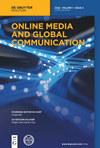葡萄牙语国家的事实核查倡议:核查方法和融资策略
引用次数: 0
摘要
近年来,事实核查已经从最初的事实核查者更关注政治话语的阶段转变为打击错误信息成为主要目的的阶段。这项工作更密切地审查了葡语国家积极的事实核查网点的标准化和定制方面,重点是使用的核查方法和组织模式。基于内容分析,我们在2019年6月从每个事实核查网站手动收集了318篇文章,然后根据六个一般概念:话语、来源、上下文、分类、图形表示和融资对每篇文章进行了检查。在巴西(13个)和葡萄牙(2个)有15个活跃的事实核查网点。在非洲国家没有发现活跃的网点。虽然在事实核查实践中有创造性的空间,但仅限于所采用的分类模型和所要求的图形表示。在研究期间,只有两个最大的葡语国家(巴西和葡萄牙)有积极的事实核查举措。在莫桑比克,我们发现一个名为Mozcheck的网站在研究期间处于不活跃状态,没有发表任何内容。从我们的分析中,我们发现了一种错误信息类型与它最常关联的媒体之间的模式:虚假信息主要在文本中传播,而虚假背景主要在视频和图像中传播,从而导致更多被操纵的内容。此外,关于用来核查内容的消息来源,我们注意到大量的帖子只依赖与新闻办公室接触的消息来源- -政治问题尤其如此。分析的数据表明,标准化趋势与这些举措与传统媒体的联系有关。而事实核查实践的对比方面与分类模型和网点创建的图形表示有关。这表明事实核查机构在组织和制度商业模式方面仍然与传统媒体联系在一起。创造力和创新仅限于记者和其他专业人员进行的事实核查。这是第一个比较葡语国家事实核查实践的研究,除了研究新闻实践的各个方面外,它还试图分析事实核查机构的组织要素。本文章由计算机程序翻译,如有差异,请以英文原文为准。
Fact-checking initiatives in Portuguese language countries: checking methods and financing strategies
Abstract Purpose Fact-checking has been changing in recent years from an initial stage in which fact-checkers were more concerned with political discourse to a stage in which combating misinformation becomes the primary purpose. This work examines more closely the standardizing and the customizing aspects of active fact-checking outlets in Portuguese-speaking countries, focusing on the verification methods and organizational models in use. Design/methodology/approach Based on Content Analysis, we collected manually 318 posts during June 2019 from each fact-checking outlets website and then examined each post according to six general concepts: discourse, sources, context, classification, graphic representation, and financing. There were 15 active fact-checking outlets in Brazil (13) and Portugal (2). No active outlets were found in the African countries. Findings Although there is room for inventiveness in fact-checking practices, it is restricted to the classification models adopted and the graphic representation demanded by them. Only two largest Portuguese-speaking countries (Brazil and Portugal) have active fact-checking initiatives during the study period. In Mozambique, we found the outlet named Mozcheck that was inactive with no published content during the research period. From our analysis, we detected a pattern between the type of misinformation and the media to which it is most often linked: false information was circulated mainly in texts, while false contexts were mainly circulated in videos and images led to more manipulated content. In addition, in relation to the sources used to verification of the content, we noticed a large volume of posts relied only on sources came from contacts with press offices – this was especially true for political issues. Practical implications The analyzed data indicates that the standardization tendencies are related to the connection of these initiatives with traditional media. While the contrasting aspects of the fact-checking practices are related to the classification models and the graphic representation created by the outlets. Social implications It indicates that fact-checking outlets is still tied to traditional media in terms of its organizational and institutional business model. Inventiveness and innovation are restricted to the practice of fact-checking conducted by journalists and other professionals. Originality/value This is the first study to compare the practice of fact-checking in Portuguese-speaking countries and, besides looking at aspects of journalistic practice, it also seeks to analyze organizational elements of fact-checking outlets.
求助全文
通过发布文献求助,成功后即可免费获取论文全文。
去求助
来源期刊

Online Media and Global Communication
Communication, Media Studies, Internet Studies, International Studies, International Relations-
自引率
0.00%
发文量
0
期刊介绍:
Online Media and Global Communication (OMGC) is a new venue for high quality articles on theories and methods about the role of online media in global communication. This journal is sponsored by the Center for Global Public Opinion Research of China and School of Journalism and Communication, Shanghai International Studies University, China. It is published solely online in English. The journal aims to serve as an academic bridge in the research of online media and global communication between the dominating English-speaking world and the non-English speaking world that has remained mostly invisible due to language barriers. Through its structured abstracts for all research articles and uniform keyword system in the United Nations’ official six languages plus Japanese and German (Arabic, Chinese, English, French, Russian, Spanish, Japanese, and German), the journal provides a highly accessible platform to users worldwide. Its unique dual track single-blind and double-blind review system facilitates manuscript reviews with different levels of author identities. OMGC publishes review essays on the state-of-the-art in online media and global communication research in different countries and regions, original research papers on topics related online media and global communication and translated articles from non-English speaking Global South. It strives to be a leading platform for scientific exchange in online media and global communication.
For events and more, consider following us on Twitter at https://twitter.com/OMGCJOURNAL.
Topics
OMGC publishes high quality, innovative and original research on global communication especially in the use of global online media platforms such as Facebook, TikTok, YouTube, Twitter, Instagram, WhatsApp, Weibo, WeChat, Wikipedia, web sites, blogs, etc. This journal will address the contemporary concerns about the effects and operations of global digital media platforms on international relations, international public opinion, fake news and propaganda dissemination, diaspora communication, consumer behavior as well as the balance of voices in the world. Comparative research across countries are particularly welcome. Empirical research is preferred over conceptual papers.
Article Formats
In addition to the standard research article format, the Journal includes the following formats:
● One translation paper selected from Non-English Journals that with high quality as “Gems from the Global South” per issue
● One review essay on current state of research in online media and global communication in a country or region
 求助内容:
求助内容: 应助结果提醒方式:
应助结果提醒方式:


